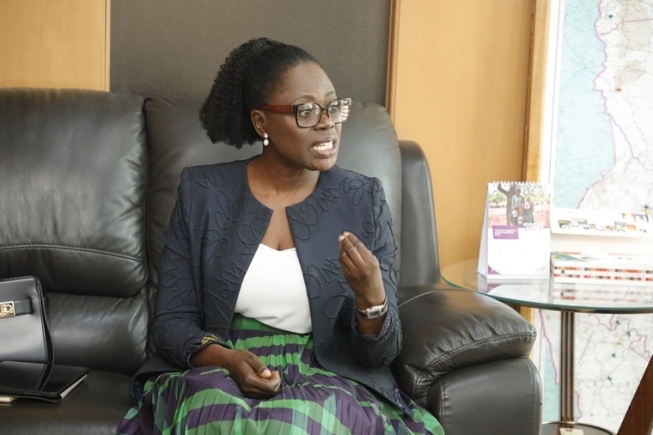
Local bourse make gains, but economic risks persist
The unstable macroeconomic environment continues to pose significant threats to the performance of the Ghana Stock Exchange, Managing Director, Abena Amoah has indicated.
She said the macro-economic environment, marked by high interest rates and inflation was dampening individual investor's ability to save and invest, while simultaneously eroding corporate profitability.
She, therefore, called for greater stability to further boost the domestic capital market and the performance of the local bourse. Ghana’s economy has been battling one of its most severe challenges in history, with inflation soaring to a 22-year high of 54.1% in December 2022.
With the stock market, reflecting the performance of the economy, the Ghana Stock Exchange also in 2022 saw volumes and value of trades dipping significantly, resulting in the composite index ending 2022 with a loss of 12.38%.
One year after implementing the three-year programme with the International Monetary Fund, the country’s macroeconomic environment began to improve, with inflation dropping to 23% in December 2023 and has since dropped to 20.9% in July 2024.
Economic growth also rebounded to 2.9% in 2023, higher than the earlier projection of 1.5%.
In the first quarter of this year, the economy grew by 4.6%, the highest since COVID-19. In response, the local bourse also bounced back in 2023, with the Composite Index returning 28.08%.
The impressive performance of the local bourse has continued into 2024, amidst the improvement in the macro-economic environment, with the composite index already up by 40%, making it one of the best performing in Africa.
Market capitalisation, which measures the value of all the shares listed on the market, also crossed GH₵90 billion in the first half of the year.
Significant risks
In an interview with the Graphic Business, Ms Amoah said although there were some signs of recovery, the economic environment continues to pose significant risks to the local bourse.
"We have seen a growth of over 80% compared to the same period last year, but it's far from what we did pre-domestic debt exchange,” she stated.
“The economic challenges are affecting all of us and so I think we need to work more with policymakers to put in place policies that direct how we manage the economy to have a more stable environment,” she added.
She said the gradual drop in interest rates currently excites the exchange, adding “we hope that this process continues so that we come to really low and sustainable interest rates that will make us competitive.
Policy direction
Ms Amoah said the second biggest challenge of the exchange had to do with specific policies to whip up interest.
“We cannot grow our capital markets without a cohesive policy framework that provides opportunities for an incentive for companies to use the market,” she stated. She called for specific policies that would encourage state-owned enterprises to raise capital by listing on the market.
She said this would help create a supply side for a potential investor to invest in a broad range of state-owned enterprises.
“We can also have policies around significant sectors of the economy like banking by having a policy that requires all foreign listed banks to also list on the Ghana Stock Exchange.
We need policies like the policy that brought MTN Ghana to the market and made over 200,000 Ghanaians shareholders. Today, we are very happy because of the performance in the share price and the dividends as well,” she explained.
Ms Amoah also called for policies around tax incentives for the private sector, stating that “the private businessman who chooses to abide by stricter governance or better governance practices by being listed on the market.”
“If we do these things, we will be able to crowd in international, regional and international capital as well. “So for us at the exchange, these are important initiatives, even as we continue to focus and drive financial literacy,” she said.
Booming exchange
The Managing Director said although the market was doing well this year, she would not describe it as a booming market yet.
She said there were currently about 50 companies across all our markets, from the main market to the Ghana Alternative Market and Corporate Fixed Income issuers.
“When we have 150 very vibrant issuers on our market. For me, that's the definition of booming,” she said.
She said the exchange was beginning to see more institutional investors like the local pension funds finally taking up the opportunity to diversify their investments.
“So yes, we have seen significant movement from them into some of the listed stocks. We are seeing the institutional investors coming more and we have seen growth in their percentage holding on the markets go up about two times.
But what will be a booming market is when we have over five million Ghanaians actively trading in stocks,” she noted.
She said every critical industry that was affecting the growth of the country’s economy must be present on the local bourse.